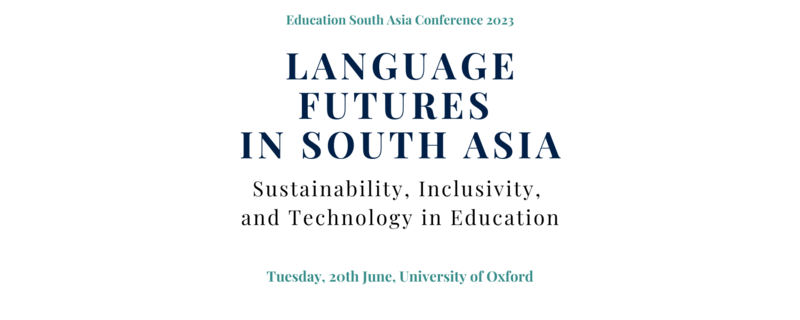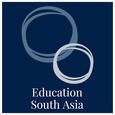Conference 2023

Registration: Please register here to attend the conference
Education South Asia is hosting its second conference in partnership with the University of Oxford, UCL Institute of Education, IndOx and the Oxford India Centre for Sustainable Development. Please find the details below: In the postcolonial and multilingual context of South Asia, language remains a matter of social, political and economic concern. Be it the question of appointing a ‘national language’; drafting language policy; the status of dialects and unrecognised ‘mother tongues’; or the marginalisation of indigenous, tribal and minority (ITM) languages — the issue of language continues to pose a challenge to policymakers, academics, educators, and civil society alike.
Linguist and anthropologist Edward Sapir called language a “great force of socialisation, probably the greatest that exists” (1933). Given how closely linked language is to societal and individual identity, it will undoubtedly play an important role in the future of these regions. Language education, therefore, becomes a compelling site of study as it not only reinforces but constructs a social reality for students (Rahman 2002). As we move forward in a world gripped by urgent issues of climate change, collapsing social fabrics of South Asian nations along the fault-lines of inequality, and an increased role of technology and artificial intelligence in society, this conference will bring the future of language education into focus.
How does language education feature within the UN Sustainable Development Goals aimed at 2030? What is the language of sustainability in South Asia and does it determine which issues are covered in education? How will language learning and teaching develop in an era of AI, DuoLingo and ChatGPT? Does language-in-education policy play an important role in determining classroom dynamics and feelings of inclusion and exclusion in education spaces? This conference hopes to answer some of these questions during the course of one day, filled with expert keynotes and paper presentations.
Sub-themes:
- The language(s) of sustainability education Language education and sustainable development goals
- Language pedagogy and inclusivity in the classroom
- Social hierarchies and classroom dynamics in language education
- Technology and language teaching strategies
- Language policy, curriculum and teaching practices
- The future of language education in South Asia
Conference Date: 20th June 2023
Key Dates
10th March 2023: Abstract submission
28th March 2023: Decisions communicated
1 June 2023: 2000 words paper submission (only for selected papers)
7 June 2023: Papers will be circulated to all panel members and chairs
Programme Booklet: You can download the booklet here
Conference Venue: Oxford Martin School, University of Oxford, 34 Broad St, Oxford OX1 3BD
Conference Convenors:
Uma Pradhan, University College London
Mohini Gupta, University of Oxford
Professor Jieun Kiaer is the YBMK KF Professor of Korean Linguistics at the University of Oxford. She is a linguist, pragmatist, and Asian specialist who researches the future of human language in the context of social media behaviors, big data, and AI linguistics. Her work includes publications on pragmatic particles, emoji language, and syntax in the AI age, with a focus on Asian perspectives.
Abhishek Ranjan Datta is a DPhil candidate in International Development at the Oxford Department of International Development (ODID) as a Clarendon and Lincoln-Kingsgate Graduate scholar. His research interests include youth, education, language, media and politics in South Asia. His doctoral project explores practices of ‘self-making’ among urban youth in Delhi, focussing on how such processes of preparation and identity formation shape ideas of mobility and aspiration.
Surajkumar Thube is a 4th year DPhil candidate at the Faculty of History, University of Oxford. The title of his thesis is 'Print, Language and Counterpublics: The Marathi Public Sphere in Late Colonial Western India, ca. 1890-1940s'. His work focuses on the non-Brahmin print and performative sphere by analysing the content of their texts and writing styles. His work seeks to investigate both the radical and conservative streaks within non-Brahmin writers amidst their contestation of the hegemonic Brahmin writerly discourse.
Kusha Anand is an Associate Lecturer and Master Dissertation Lead at the UCL Institute of Education. As an international policy sociologist, she specialises in researching education reforms in India. She has recently published three books: Teaching India–Pakistan Relations, Delhi's Education Revolution, and Bridging Neoliberalism and Hindu Nationalism. Her research findings have been shared with policymakers and parliamentarians in the UK, Additionally, she has contributed to interdisciplinary research projects focusing on minorities, refugees, and migrants in the UK.
Uma Pradhan is a Lecturer at IOE, UCL's Faculty of Education and Society and a Research Associate at the University of Oxford. Uma's research explores cultural and material dimensions of language education, especially in relation to technology, inequality and diversity. She is the author of Simultaneous Identities: Language, Education and the Nepali Nation (Cambridge University Press, 2020), as well as a co-editor of Anthropological Perspectives on Education in Nepal: Educational Transformations and New Avenues of Learning’ (Oxford University Press, 2023) and Rethinking education in the context of post-pandemic South Asia: Challenges and possibilities (Routledge, 2023). She serves as a co-editor of Compare: Journal of Comparative and International Education, Associate Editor at Studies in Nepali History and Society (SINHAS), and Executive Committee Member of the Britain Nepal Academic Council.
Mohini Gupta is a DPhil Candidate at the Faculty of Asian and Middle Eastern Studies, University of Oxford. She has been the Charles Wallace India Trust Translator-Writer Fellow in 2017. She has co-edited the forthcoming Rethinking Education in the Context of Post-Pandemic South Asia: Challenges and Possibilities (Routledge, 2023) and The Hindu Bard: The Poetry of Dorothy Bonarjee (Honno Press, 2023). An alumna of SOAS University of London, she has been a Research Fellow at Sarai, CSDS; and a translator-in-residence at the Sangam House international writers’ residency in Bangalore. She has written on literature and translation for publications such as The Caravan Magazine, Huffington Post, TheWire.in, Scroll.in and the WorldKidLit Blog.
Marwa Ahmed is the India Oxford Initiative (IndOx) Programme Manager. IndOx, is a cross-divisional platform at the University of Oxford to share, promote, and build on Oxford's diverse range of collaborations and partnerships with India. Working closely with the IndOx Strategy Board, she is responsible for managing IndOx activities, facilitating its sustained growth, and is the main point of contact for the Initiative.
Vinita Govindarajan is the Partnerships and Communications Manager at the Oxford India Centre for Sustainable Development. She manages OICSD’s partnerships, strategic communications, research outreach design and relationship building, and is responsible for the Centre’s operations. She works with the Research Director on developing the Centre’s research strategy, global presence and impact.
Programme Booklet: You can download the booklet here
My Phone Won't Teach Me Malayalam: South Asian Languages and Language Acquisition Apps
Sameer Thomas, Krea University, India
Learning, Language, and Cross-Cultural Connection: A Digital Ethnography on a Virtual Education Program for Multilingual High School Students Across five South Asian countries
Minha Khan and Harleen Kaur, University of Oxford and Stanford University
Navigating the Pedagogical Implications of Digital Education in Bangladesh
Andrianna Bashar, University of Oxford, UK
Remembering Language: Reviving Nepal Bhasa through Artificial Intelligence (AI) Translations
Uma Pradhan, University College London, UK
Bengali Linguistic Nationalism, Neoliberal English Education, and the Endangerment of Indigenous Languages in Bangladesh
Anwar Ahmed, University of British Columbia
Attitudes and Practices of Undergraduates in Learning English as a Second Language in State Universities in Sri Lanka
Sajeewani Priyangika Vanderkoon, International Institute of Health Sciences, Sri Lanka
From Access to Knowledge to Advancing Knowledge: A case for critical multilingual higher education space in India
Shivani Nag, Dr B. R. Ambedkar University Delhi, India
Multilingualism and globalisation in remote trans-Himalayan India: How does place-identity affect language learning?
Saurav Goswami, Georgetown University, USA
A Pedagogy-language Conflict between Minorities vs Majority: A Case Study of Marathi language in Maharashtra (India)
Mayur Kudupale, University of Delhi, India
The Influence of Teachers on the Caste Gap in English Language Education: Evidence using Matched Student-Teacher Level Data from India
Soham Sahoo, IIM Bangalore, India
‘We are left behind in the race of academic competition’: Experiences of inclusion and exclusion in higher education
Karan, Dr B. R. Ambedkar University Delhi, India
Language of Caste in the School Textbook in India
Nilesh Sawant, The University of Edinburgh, Scotland, United Kingdom
Linguistic Homogeneity, Nation building and the 'Others': Evidence from textbooks in India, Pakistan and Bangladesh
Laraib Niaz, University of Cambridge, UK
Role of Education in the Death of Vernaculars in India
Juno Michael Alphonse, University of Oxford, UK
Gender Sensitization in Schools: Beyond the Gender-Neutral Address
Manisha Bhadran, University of Hyderabad, India
‘Erased’ Curriculum: Language Textbooks as a Site of Conflict in India
Mohini Gupta, University of Oxford, UK



